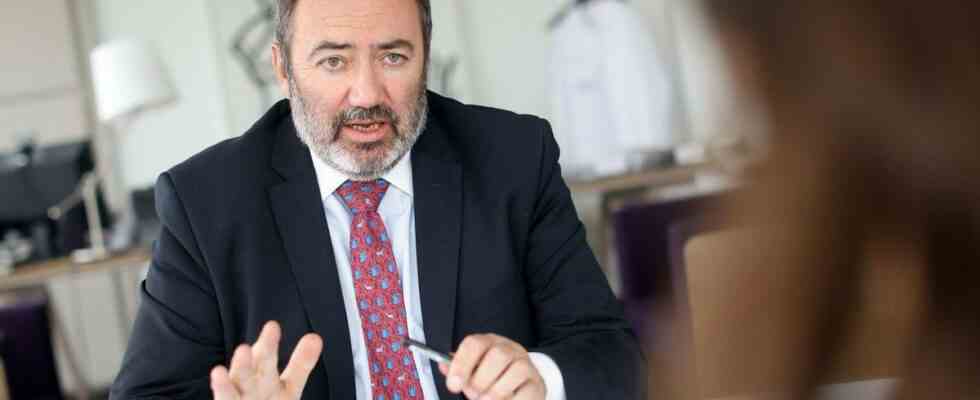The new Minister of Health intends to put prevention at the heart of his political roadmap. François Braun, former emergency doctor then head of the Emergencies, general medicine, justice and precariousness center at Mercy hospital in Moselle, spoke a lot this week in the media. At Sunday newspaper this weekend, at France Inter the next day. He chose 20 minutes and its young readers to talk about sexual health. “There are two things that pose a problem for me: the increase in sexually transmitted infections (STIs) specifically chlamydia and gonococcus, as well as the problem of accessibility to emergency contraception,” he summarizes. this Tuesday in his office at the Ministry of Health. The Minister announces to 20 minutes several measures to remedy this. All will be included in the 2023 Social Security financing bill.
How to explain the resurgence of STIs, can’t prevention at school be improved on this subject?
All areas of prevention must be improved, France is lagging behind other European countries. Only 2% of our budget is devoted to prevention against 3% for our neighbours. Things have been done in terms of sexual health education in schools, but it is clear that this increase in STIs is real. It is very complicated to know the exact cause: is it a lack of prevention? of information ? or a more global relaxation on this oh so essential question? Anyway, my role is to react as quickly as possible to break this dynamic.
In terms of prevention, there are delays in the practice of sports activity, in vaccination against the papillomavirus, in cardiovascular diseases, cancers.
I therefore announce that screening for STIs will be free and without prescription up to the age of 26, for young people, who are part of the population most affected by these infections. Currently, this screening is free only for HIV. From now on, the possibility of screening will be extended to all sexually transmitted infections to fight as early as possible against this resumption of infections.
Regarding contraception, there are still major inequalities between female contraception and male contraception… Why not develop the latter further?
I will refer to the High Authority for Health to have recommendations from scientific authorities on male contraception. But let us first strengthen the protection of women, then open from next year, according to scientific data, more widely, if necessary, to male contraception.
With regard to female contraception, I announce the strengthening of the protection of women by facilitating their access to emergency contraception. [ou pilule du lendemain] in pharmacies, free of charge and without a prescription, at any age. Today, it is free and without a prescription only for young underage women, and free with a prescription for those under 26. We had to fight against their difficulties in accessing emergency contraception, because we know that its effectiveness is at its maximum within 24 hours following the report at risk of pregnancy.
You say that France is behind on the issue of prevention, particularly in terms of sexual health, what needs to be improved?
All. This is why I am delighted that this ministry is that of Health and Prevention, we are finally putting prevention first. When we talk about health, we usually only talk about care. However, it is also individual well-being on a daily basis, which must be a priority. This includes promoting wellness through a screening, care and follow-up policy. It is this set that must be taken care of.
In terms of prevention, there are delays in the practice of sports activity, in vaccination against the papillomavirus, in cardiovascular diseases, cancers, etc. To this end, I announced the establishment of health check-ups, free consultations open to the key ages of life, 25, 45, 65 years old. At 25, it’s precisely the time to take stock of sexual health, for example. We must make this notion of prevention accessible to our fellow citizens.
How to improve sex education knowing that only 13% of the sessions provided for by law are carried out at school, according to a WeAll survey?
These studies are very interesting because too often in our country, decision-making is not accompanied by an evaluation of the measures put in place. However, in this specific case, it does not work sufficiently. We are having discussions with my colleagues in the Government, including the Minister of National Education, Pap Ndiaye, on the issue of school health and university health. At a time when society tends to withdraw into these questions and when the questioning of the right to abortion observed in certain countries challenges us, it seems more essential than ever to put these questions of sex education at the heart of our thinking.
Charline Vermontwho maintains the Instagram account ” Orgasm and me »believes that a few dozen accounts like his provide sex education to young people on social networks… Isn’t it the role of the public authorities to educate on these issues and in particular that of consent?
It is very good that the company takes hold of this subject. All communication channels are useful to raise public awareness on these topics. The more the message is disseminated, the more it allows a general awareness.
Precisely, in view of what is happening in the United States, do you think about protecting access to abortion in France and how?
As Minister of Health, I want to reaffirm it very clearly, we must protect this essential achievement for women, which is to have free use of their bodies. The Government has also spoken on it, and I am in favor of including the right to abortion in our Constitution.

